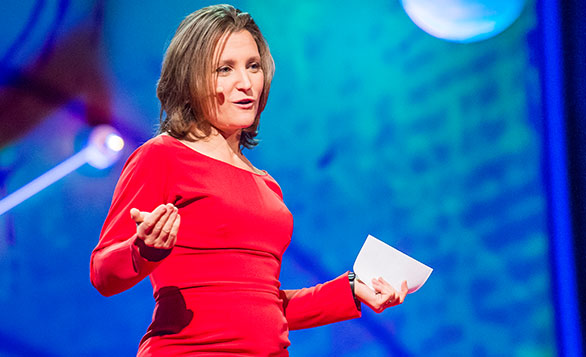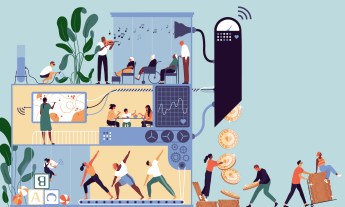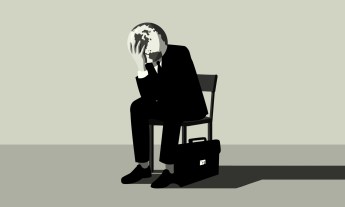
Chrystia Freeland writes about the power of money. As a journalist, she examines how money shapes society, impacts politics and essentially makes the world go ‘round.
In today’s talk, given at TEDGlobal 2013, Freeland tackles the growing global plutocracy, looking at how 21st century democratic capitalism is making the rich richer while pulling up the ladder so that the middle and working class aren’t able to follow suit. Freeland became interested in plutocracy after watching “the collapse of communism and the rise of capitalism in its stead in the former Soviet Union.” She saw how emerging billionaires there were “breaking out of their communist shackles” and rising to the top. So when she moved to New York City in 2010, she was surprised to notice how similar the “titans of finance,” as Tom Wolfe dubs them, were to the Russian oligarchs in that they’d shaken off the demands of democratic capitalism and were succeeding in globalized industries that did very little to help the economy as a whole. As she describes, these “American masters of the universe” were thriving amidst growing income inequality.
It was then that Freeland began really studying this economic climate, making connections and dissecting why so much of the economic action was happening at the very top tier. In the pre-Occupy Wall Street days, she began to wonder: why is no one surfacing this?
“I think the people who are focused on income inequality tend not to be the people who focus on business,” she says, answering the question now. “They don’t really know about what’s happening in business, but it is business people who are the going to be at the top of the income distribution. All of those pieces coming together made me believe that this was a hugely important phenomenon in the world economy and that it wasn’t being written about enough.”
Her research, which culminated in the book Plutocrats: The Rise of the New Global Super-Rich and the Fall of Everyone Else, is what Freeland explains in today’s talk. So what is global plutocracy? Why is it happening now? How is it hurting our economies? And what can we do to stop it? The TED Blog called Freeland to discuss what the future of 21st century capitalism might look like, and to talk to her about her recent decision to run for a seat in Canada’s Parliament.
What makes plutocracy different from meritocracy? Why is it not “fair?”
One of the things that I write about, which I think is a really important factor in what’s going on and that really shapes how the plutocrats think of themselves and their relationship to everybody else, is the fact that the 0.1% is a meritocracy. Even as the gap between those at the very top and rest has increased, those at the top are more likely now to be self-made than they were 30 years ago. By self-made I don’t mean born in absolute poverty, in a ghetto or in a slum, but I do mean you built your own business, rather than inheriting it. My concern is that as income inequality grows, you have this sort of phenomenon — and its been documented — that as the distance between the rungs on the ladder increases, it gets harder to go between those rungs. As that gap gets bigger, for all sorts of reasons, the ladder gets pulled up. A Canadian economist who has done some pretty important work on this, Miles Corak, has shown that as income inequality grows, social mobility declines. That’s the single biggest problem and the thing we need to be really worried about.
So people at the top now are more likely to be self-made. This makes me wonder: why didn’t “the greatest generation” have problems with plutocracy? Why wasn’t this a problem 30 years ago?
I’m really glad that you refer to that post-war period because so many of our expectations about how industrial democracy works are shaped by that era. We feel there’s a continuity. I don’t think we feel there’s been a radical break — but there has been. We think of that era as being conservative, but it was a much more socially progressive, in terms of the underlying economic trends and policies, than the one we’re living in now. It was a period of very long economic growth throughout North America and Western Europe, and at the same time it was a period when income inequality was shrinking. Not only was the middle class doing really well, but the gap between the top and bottom was decreasing. One economist, Larry Katz at Harvard, his term for it is “the society grew together,” and that is true. We imagine our grandparents living in this conservative society, but in some ways they lived in a much more progressive society — a much more equal society, a society in which there was much more of a collective experience.
Do you think that the way we think about capitalism, in the post-war generation way, has stopped working for the middle class as we’ve gotten less economically progressive?
It hasn’t stopped working completely for the middle class, but yes I think capitalism has stopped working for the middle class today. To me that is the single biggest problem we face.
Besides the shrinking middle class, what else do you think we’ve lost in this economic shift?
Well that’s the biggie, right? If it were possible, and it seems not to be, but if we had an emergence of global millionaires, but at the same time the middle class was doing tremendously well — there were vast numbers of well-paying jobs, everyone could easily afford to go to university and people in the middle class were secure about their retirements — than we wouldn’t have so much to worry about. But that’s not the case. The hollowing out of the middle class, which is an integral part of the economic story, is the core issue. But they are connected, because they’re driven by connected economic and political forces.
When do you think plutocracy becomes aristocracy? At what point does that shift occur?
My concern is it could be occurring; we could be at the beginning of that. That question is another very succinct way of making the point about the connection between rising income inequality and declining social mobility. If that process is allowed to continue unchecked, then what you’re going to see is indeed plutocracy becoming aristocracy. If you have this big gap in wealth, which you do have, and it’s harder and harder for people at the bottom to make it into that top layer, then yes you’re going to see a meritocracy become an aristocracy, with very devastating consequences for our society, for our democracy and for our economy.
You say in your talk, “If you’re very, very smart and very, very lucky, you can get very, very rich, very, very quickly.” Why has our economy become a collection of superstar success stories disconnected from growing poverty?
It’s the nature of the economic forces that are more powerfully at play in the world today: the technology revolution and globalization. Put those two together and what you get is this sort of winner-takes-all economy. In the winner-takes-all economy, if you’re the winner, you rocket to the top and that pulls you away from everybody else. One thing I want to emphasize is that the people who are really, really smart and really, really lucky and really hard working, and who through a combination of all those things manage to prosper in this economy — they are not bad guys. We should all want to have as many of them around as possible, and as many of them in our country and in our cities as we can, because if you don’t have them, then you don’t have economic growth at all. The point is what we have to figure out — and I think a lot of this is going to be a political and social set of solutions — how to have societies in which you have vigorous economic growth — where innovation is encouraged, these fertile places for innovators — but at the same time find a way to harness that so the growth is widely shared.
In a recent article you wrote about ways to “retool capitalism for social good.” What are some of those ways and is anyone at the top interested in implementing them?
I think there are actually a lot of people at the top who are really interested in figuring out ways to solve this problem of an economy that doesn’t work for the majority of people. Some of that concern is self-interest — enlightened self-interest. If you’re a smart capitalist who thinks for the long-term, then you’re smart enough to realize that an economic set-up which is not delivering for the vast majority of people — particularly in a democracy where the vast majority of people count — is not going to last. Even if you are doing well, it’s not a good long-term solution. In terms of what those solutions might be, we are all beginning to grapple with this question. It wasn’t until the financial crisis that people started to focus on how big the gap had become and the extent to which that impacted the economy. This isn’t just the story of one country. This is something we are seeing across the western developed economy — that 21st century capitalism isn’t delivering for the middle class.
How do you think the age of plutocracy will affect future generations? What do you think the children of plutocrats are inheriting and what do you do think the children of everyone else are inheriting?
We don’t know for sure. These are man-made processes, so our actions can make a difference. Having said that, the people who I worry about the most are the younger generation. I worry about a generation which is coming of age in an environment where for the first time since the post-war era — for the first time in the lifetimes of pretty much all of us who are around and active — social mobility is declining. There is a very good chance that children will be less affluent than their parents, rather than more affluent. One of the things which has really been the success story of modern capitalist democracy, and I’m talking in very broad brushstrokes, was watching the collapse of communism and the broad recognition that capitalist democracy had worked. It had worked not just for the fat cats as Marx had predicted it would; it worked broadly in society. There was social mobility. Children across society in the western industrial democracy could very reasonably expect to live better than their parents. That is no longer the case, and that is economically worrying. It’s hard to be a member of a generation in which you start life with student loans, having a real struggle to get a job, maybe having to move back in with your parents. That’s tough. It’s also I think really concerning for what the shape of our society and our democracy is going to be.
After TEDGlobal, you wrote an op-ed for Reuters about the gathering on economic thinkers and what that meant for the end of plutocracy. What about TEDGlobal struck you? What would the end of plutocracy look like?
That particular piece was inspired by something that I found to be very promising: that some of the people — by no means all, but some of the people — that are beneficiaries of the current system are nonetheless worried about it. That’s really great. The conversations that are starting to happen at places like TED are a sign of that. TED is certainly a gathering of an incredibly eclectic, incredibly interesting community, but it’s also an elite community — at least an important portion comes from that global 1%. So it was very striking to me, and very encouraging, the extent to which people in that space support and believe in, and are really enthusiastic about, capitalism. For me, this is something important to underscore and put exclamation marks beside — we don’t want to throw the baby out with the bathwater. The people in that community are starting to address this issue — that is really promising. It makes me hope that we can come together and start coming up with some solutions.
Speaking of solutions, a few weeks after TEDGlobal, you announced that you were seeking the Liberal Party nomination for Member of Parliament in Toronto Centre. What inspired you to run for political office?
In some ways, writing my book and then talking to people about it. By the time I finished writing, I had thoroughly convinced myself of my own conclusion — that we are living through a profound, exciting and also fraught-with-peril time of economic change, and that it’s not going to be good for the broad society unless we actively work on it … In talking to people about my book, I had people say to me, “You’re clearly passionate about this. You’ve convinced me. What are you going to do about it?” I thought that was a really good question. This fleet of economic questions is really the pre-eminent challenge for our generation. So the people asking that are right — we should do something about it.
Especially among journalists, politics is not a pursuit that’s held in high esteem. We tend to be cynical about it — but I actually believe in democracy. I cut my teeth as a journalist writing about societies that didn’t have democracy. If you believe in democracy, than you can’t trash it by being cynical about the people who do democracy: the politicians. So, when the opportunity presented itself, I realized that I needed to put my money where my mouth is. And that’s what I decided to do.
[ted id=1791]
Nia Ashley is an editorial assistant at TED.











